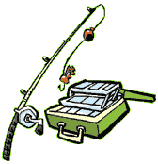
FISHING ACTIVITY CARD
Parts of the Body Worked

Arms

Just what does it take to fish?
Gear Up
You’ll need a fishing rod and reel. Look for a rod that’s about as tall as you are and has a push button reel. You can also use a cane pole (no reel) and tie your own line to the end.
Gotta have bait too—earthworms rule for most fish. You can buy them, dig for them, or find them lying around after a rainstorm. A net will help you scoop the fish out of the water once you’ve brought them in. You’ll also want a basic tackle box to hold your stuff.
Play it Safe
Make sure someone knows where you are and how long you will be gone. Check out all the signs where you’ll be fishing and stick to what they say. Pick the right spot—stay away from tree branches that hang over the water, power lines, or strong currents. Look before you sit, step, or touch—you don’t want to get near animals, or slip on wet rocks. Be careful if you’re fishing off a dock or pier so you don’t fall in. Check the weather report before going fishing and if a storm sneaks up on you, head for home.
Wear a life jacket if you are anywhere near deep water, running water, or on the ice. Wear a hat and sunscreen to shield you from the rays, and make sure you have your shades on to fight the glare off the water.
Fishing hooks are sharp, so be careful not to hook yourself, or someone else! Keep a first aid kit handy in case you get stuck. Carry a whistle to get help if you need it.
If you want to ice fish (fishing through a hole drilled in the ice), wait until the ice is at least 4 inches thick. For fly fishing (special type of fishing in moving water with bait handmade to look like bugs), shuffle into the flowing current sideways. If you’re fishing in the waves, shuffle your feet along to scare away fish and other sea creatures.
How to Play
Fishing is a great way to spend some “nature time” and maybe even get dinner while you’re at it! Fish live in all sorts of water—ponds, rivers, lakes, oceans—and there are tons of ways to catch ’em. But let’s start with the basics.
Hook, Line, Take your rod and stick the hook at the end of the line (plastic string) through something fish think they want to eat: bait! Fish love real, squirmy worms, but you can also use plastic bait or other tasty things like crickets, night crawlers, or little minnows (kind of fish).
And Sinker! Grip your rod like you’re shaking hands with it. Keep your thumb on top of the release button. Make sure no one is near you—you’re trying to hook fish, not people. Put your weight on the balls of your feet and keep your wrist straight. Bring the rod back just behind your head, hold the handle tight, and quickly move the rod forward as you press the release button to let go of the line. The hook and bait should fly out far in front of you and drop into the water. Relax and wait until you see a tug on the line. Is it a fish? You’ll have to reel it in to see.
Fun Facts
Fish swim by contracting their muscles (making them smaller)—first on one side of their body and then on the other—to whip their tails from side to side. The fins pointing straight up help the fish keep its balance, and fins on the belly help the fish hang out in one place, as well as move forward.
The world’s largest fish is a whale shark. It grows to be more than 50 feet long and weighs several tons! (1 ton = 2,000 pounds.) The world’s smallest fish is a goby. It only grows to be a ½ inch long!
Check out how old a fish is by looking at the growth “rings” on its scales. They’re kinda like the rings found on tree trunks, except fish get a new growth ring every summer and every winter. Every two rings represent one year.
A bass (kind of fish) brain has two memory centers-one for each eye. That’s why it’s possible to catch the same bass twice. The bass sees the bait out of one eye the first time it gets caught. If it is thrown back into the water, it can see the same bait out of the other eye and not remember it. So, it may decide to go in for a bite anyway.
